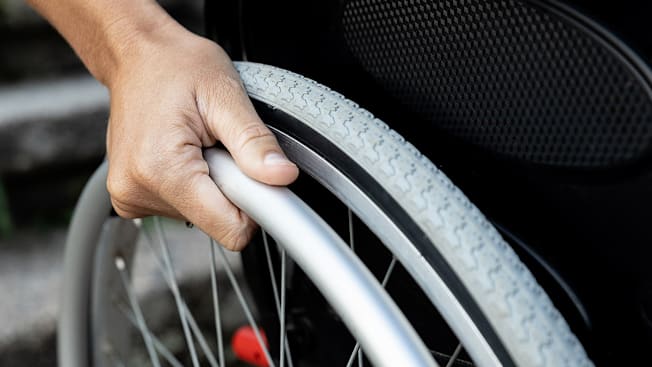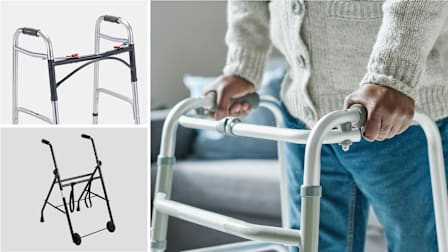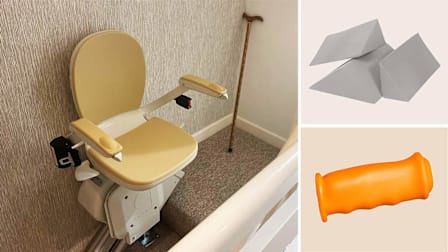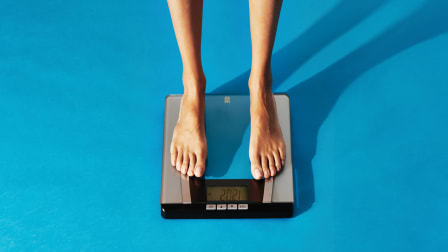Need Mobility Equipment? Read This First.
Shopping for a scooter, a wheelchair, or another mobility item can be overwhelming—and expensive. Here's where to start, what to look out for, and how not to overpay.
When you shop through retailer links on our site, we may earn affiliate commissions. 100% of the fees we collect are used to support our nonprofit mission. Learn more.

The U.S. medical system can be tough to navigate—financially, emotionally, and logistically. It can be even more complicated when you’re trying to obtain durable medical equipment (DME) essential to your daily life, like a wheelchair, cane, walker, or other mobility device.
Accessibility & Aging
Mobility scooters, hearing aids, motion-sensing lights, lift chairs, adaptive kitchen tools, adjustable beds, and more—products to make life easier, safer, and more comfortable.
Start With Your Doctor
If your doctor tells you that you need mobility equipment, ask for a prescription. Proper documentation indicating exactly what you need makes everything easier. “If you have a clearly diagnosed health condition that requires special equipment as well as a prescription, that’s going to open a lot of doors,” says Wynter Johnson, founder and CEO of Caily, an app for caregivers.
While you’re there, you should also ask the office to check with your insurance provider to find out if all or part of the device’s cost is covered. The doctor might even be able to help you get the device. And if cost is a hardship, the office might be able to point you to savings options from manufacturer patient-assistance programs.
Call Your Insurance Company
If your doctor’s office can’t verify mobility device coverage for you—or if you have further questions about coverage—flip over your insurance card and call the number on the back to ask if the device you need is covered and learn about the insurance company’s preferred vendors.
If you’re 65 or older and enrolled in Medicare, you may be covered. To qualify, you need a physician to indicate that a device is medically necessary, the equipment needs to be intended for home use, and you’ll likely need a prescription. You’ll also need to obtain the device through a Medicare-enrolled DME supplier.
Original Medicare typically covers items like wheelchairs and walkers. According to Medicare.gov, after your Part B deductible, you’ll pay 20 percent of the remaining cost, unless you have supplemental coverage that covers more. Medicare has a supplier search tool and a guide to what DME is covered by Medicare Part B.
If you’re on Medicaid, coverage for mobility devices varies by state. You can start here to find details for your state.
In cases where the purchase of a mobility device is not urgent (though it often is), you might save money by waiting to buy at the beginning of the year, when Medicare deductibles reset. Buying equipment early will get you to hit your deductible faster, and that may mean paying less out of pocket for other devices or medical costs later in the year.
To ensure you get the most from your insurance benefits, ask about qualified suppliers who are enrolled in Medicare or accept private insurance. Aetna, for example, provides a DME National Supplier List that might be helpful to start with, but says you should confirm the supplier is part of your plan’s network on your own.
Michelle Rankine, PhD, owner of Right at Home, a global senior home care franchise corporation headquartered in Omaha, Neb., reminds veterans to contact the U.S. Department of Veterans Affairs (VA). They may provide DME coverage for eligible veterans. Here are some specific requirements the VA puts forth.
Use Pre-Tax Dollars
Your Flexible Spending Account can help cover DME expenses. “If the consumer has money in a flexible spending account (FSA) or a health savings account (HSA), they can use that pre-tax money to purchase a wide range of medical equipment, even if the equipment isn’t covered by their health plan,” says Beth Southorn, executive director of LifeSteps, a California social services nonprofit.
On Amazon, you can filter your search to see which items are FSA or HSA eligible. Just go to the medical supply page, check the FSA/HSA box in the left column, then search for the item you need.
Consider Renting Durable Medical Equipment
If you need an expensive piece of equipment for only a short time, it may make sense to rent it. Even if you’re covered by insurance or Medicare, your copay for, say, a wheelchair, might be more than the rental fee. You might also consider secondhand equipment.
But be cautious. “When evaluating secondhand mobility aids like walkers or crutches, ensure they are structurally sound,” says Brian Nwannunu, MD, an orthopedic surgeon at the Texas Joint Institute. Nwannunu recommends buyers check for “cracks, rust, or loose parts—and that all adjustment mechanisms lock securely.” He also advises checking the model number online or with a healthcare provider to confirm that the model hasn’t been recalled and still meets current safety standards. To be safe, consider bringing the device to your doctor or physical therapist for review before using it.
A great place to start when looking for mobility equipment is with friends. “Many people already have them stored away from a past surgery or injury,” Nwannunu says.
Here are some secondhand platforms, groups, and initiatives to consider:
- Buy Nothing Project (find local groups on Facebook)
- Disability advocacy organizations
- Facebook Marketplace
- Goodwill Home Medical Equipment
- Hospice and estate sales
- Lending libraries
- Local exchanges, such as the Arizona Assistive Technology Exchange (ATEX) and Friends of Disabled Adults & Children (FODAC) in Georgia and South Carolina
- Project MEND
- Thrift stores
- USME
If it’s a hardship to pay for the mobility device you need, you can reach out to a social worker, your primary care provider, or another healthcare professional for guidance.
Look Out for Scams
AARP warns people to be wary if someone calls with an offer of free medical equipment. “It’s almost certainly a scam meant to steal your identity or a scheme to bill Medicare for devices that aren’t medically necessary and, oftentimes, never arrive,” Kimberly Lankford writes for AARP. The article also advises double-checking your Medicare summary notice for charges and reporting any fraudulent charges you find.
Be cautious if you receive an unexpected call from a third party claiming that your doctor has ordered equipment for you. Your doctor’s office would have notified you if they had ordered something for you. Do not share personal information like your Social Security number or Medicare details on a call like this. There’s a good chance it’s a scam. Hang up and check in with your doctor’s office.




